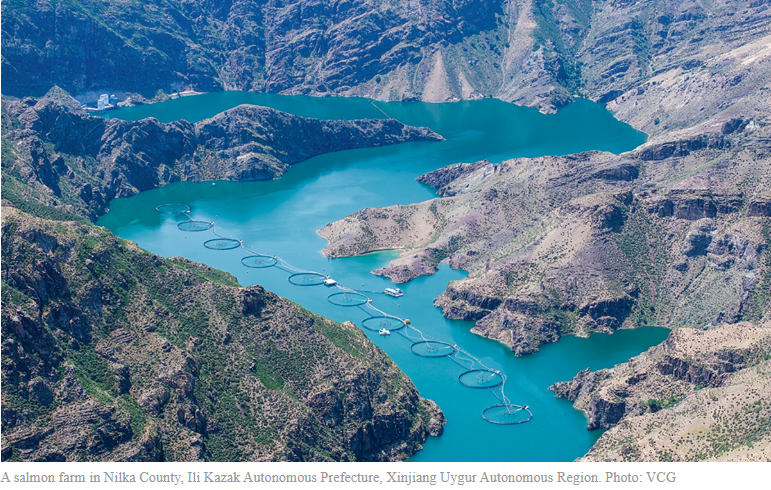Commentaries
Your Present Location: Teacher_Home> Ding Gang> CommentariesSalmon farming in Xinjiang reflects‘two mountains’concept
Salmon farming in Xinjiang reflects‘two mountains’concept
Source: Global Times
By Ding Gang
Published: Aug 20, 2025 08:48 PM

Looking out the car window, the rolling Tianshan Mountains unfold like a colorful and richly beautiful oil painting scroll.
I'm traveling to the famous "Hundred-Mile Gallery" Tangbula grasslands in Nilka County, Xinjiang Uygur Autonomous Region, anticipating a romantic encounter with blue skies, verdant trees and clear streams.
In August, Xinjiang's sunlight is intense yet not oppressive. A refreshing breeze carries the fragrance of meadows into the car, invigorating my spirit.
As I round a mountain bend, my view suddenly opens to brilliant blue lakes shimmering in the sunlight. What I initially took for mere scenic beauty soon piqued my curiosity when I noticed modern factory buildings along the shore.
"That's a salmon processing plant," my guide explained with a smile.
Salmon? In the heart of the Tianshan Mountains, thousands of miles from any ocean, I discovered a thriving salmon farm.
When people think of salmon, they naturally envision deep oceans. Yet here in the foothills of the Tianshan Mountains, where the Kashi River winds through Nilka County in the Ili Kazakh Autonomous Prefecture, this inland region hosts a remarkable salmon farming operation. The mountainous location with its cool temperatures and abundant glacier meltwater creates a nearly perfect environment for salmon cultivation.
The water here originates from the melting of the Tianshan glacier, maintaining a steady temperature between 8 C and 13 C throughout the year. With its pristine quality and high oxygen content, it's truly a paradise for salmon growth.
Hours later, we enjoyed grilled salmon at a hotel restaurant. The fish - crispy on the outside and tender on the inside - was served with a special sauce and sprinkled with local wild herbs. The taste was exceptional.
Online sources indicate that Nilka County has become China's third-largest salmon production base. Salmon farming in this region began in 2014, and after a decade of development, production is projected to reach 9,000 tons by 2025.
In this once impoverished area, "lucid waters and lush mountains" have indeed become "invaluable assets." The lower reaches of the Kashi River in Nilka County have been designated as a practice and innovation base for the "two mountains" concept by the Ministry of Ecology and Environment.
On the return journey, the magnificent views of the "Hundred-Mile Gallery" and the salmon processing plant by the reservoir merged in my mind - a vivid illustration of the "two mountains" concept in action.
There is a Chinese idiom: "You can't have both fish and bear's paw," which conveys the same meaning as the English proverb "you can't have your cake and eat it." The practice of the "two mountains" concept in Xinjiang and across China has vividly enlightened the world that we don't need to choose between "fish" and "bear's paw" (environmental protection and economic development). We can have both. Xinjiang has become a key location for implementing this concept.
Over the years, overseas media have primarily focused on Xinjiang stories centered on the region's stability and security. However, a more authentic Xinjiang story now focuses beyond stability, exploring how to forge a new path of development on the foundation of that stability.
In recent years, Xinjiang has undergone a profound transformation in its development approach. Rather than simply copying models from other regions, Xinjiang has leveraged its unique ecological advantages to drive economic growth.
From initial technology imports to current innovation, and from relying on imported fry to establishing a complete industry chain, Xinjiang's salmon industry exemplifies how the people here have forged a distinctively Chinese development path.
Sitting in the car, I looked back through the window as the setting sun draped the Tianshan Mountains in a golden veil. This land, blessed by nature, has fostered a harmonious development approach that promotes coexistence between humans and the natural world.
Today, salmon from Nilka has "swum" to the dining tables of foreign countries.
For those who want to understand the story of Xinjiang, I suggest tasting the delicious Xinjiang salmon; as you do, let your imagination of green hills and clear waters take flight.
The salmon not only offers a delicious flavor but also embodies the Xinjiang people's pursuit of a better life, their commitment to green development and the wisdom of China's distinctive development approach.
The author is a senior editor with the People's Daily and currently a senior fellow with the Chongyang Institute for Financial Studies at the Renmin University of China. dinggang@globaltimes.com.cn. Follow him on X @dinggangchina
Key Words: 'Two Mountains' concept























































































 京公网安备 11010802037854号
京公网安备 11010802037854号





